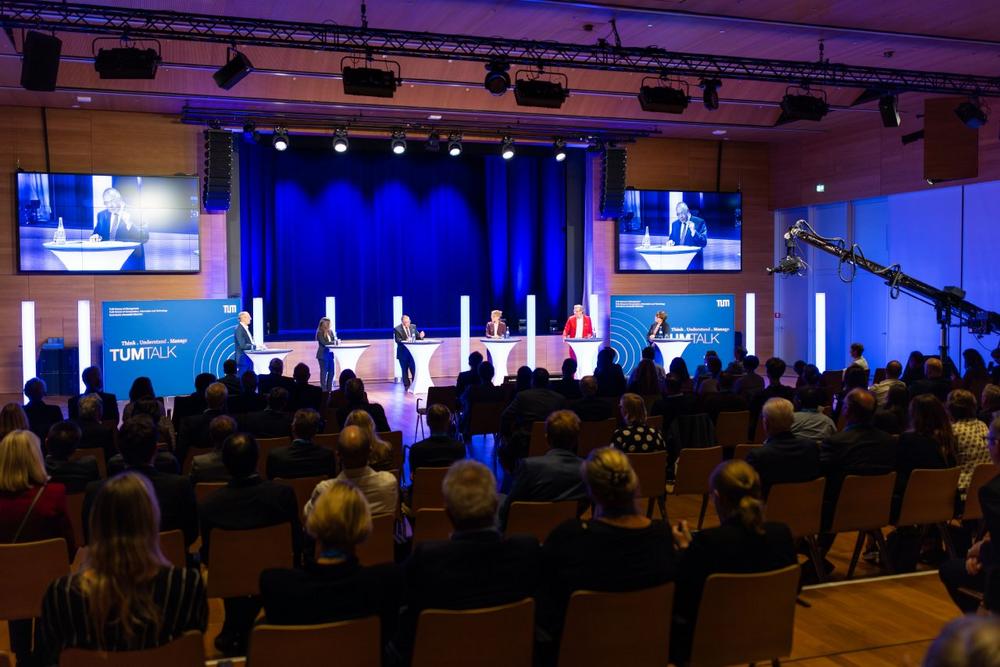Hopes are high – and, for the time being, exaggerated: as great as the potential of automation and artificial intelligence may be, digital technology is currently able to support the vast majority of jobs, but it cannot replace them. Too overzealous in results, too inexperienced in decisions, said Chris Russell, Dieter Schwarz assistant professor of artificial intelligence, leadership and policymaking at Oxford University: "Artificial intelligence is currently like an intern on their first day of work: very enthusiastic, very eager – and very reluctant to say ’no‘ sometimes.”
The scientist’s impulse recently opened a lively discussion among the more than 150 participants at the TUM Talk at the Heilbronn Education Campus. Under the heading "Skilled workers of the future – a myth?" representatives from universities and companies discussed at the fourth edition of the networking format at the TUM Campus Heilbronn.
Opportunity for entrepreneurial engagement
In board offices and HR departments, in production halls and coffee kitchens, the shortage of shortage of skilled workers is a topic of conversation nationwide. "You really have to come up with something to keep the store running," said Albert Berger, chancellor of TU Munich. The challenge could become an opportunity, added Professor Dr. Helmut Krcmar, President’s Representative for the Development of the TUM Heilbronn Campus. For example, for "committed entrepreneurs who have a good chance of standing out from the competition with clever concepts”.
Numerous companies have already taken on this task. Even if they have to throw decades of tried-and-tested traditions overboard. The bonus payment, for example could now be converted – depending on the phase of life – into a pension allowance or a credit for the time account, reported Angela Todisco, Head of Human Resources EMEA North at the software group SAP. In addition to providing a meaningful work assignment, such programs help attract – and retain – employees. "We see that with a lot of small adjustments, we can do a lot of great things," said Todisco.
Change becomes the new normal
At the same time, however, companies are finding their efforts thwarted. Politics and bureaucracy are making it difficult to reach all potentially available workers – despite the foreseeable demographic decline. This applies, for example, to the excessively high number of school leavers as well as for the insufficient support for working mothers, warned Stefan Wolf, president of the employers‘ association Gesamtmetall. He also said that foreign skilled workers were increasingly less interested in applying for German jobs: "We can’t expect qualified specialists to join the long queue in front of the immigration office," criticized Wolf and called for an immigration law based on the Canadian model.
One thing is obvious: Uncertainty is high in many places. How much can, how much must companies do to convince and retain employees? What role can and will technology play in relieving employees – or even taking over jobs altogether? To what extent will demands on employees change over a working lifetime? "Change is everywhere", stated Roland Hehn, Chief Human Resources Officer at Schwarz Dienstleistungen.
The individual strategies, according to the summary of the TUM talk participants, will become more and more specific in the long term. The basis in all positions, however, is willingness to change. This is a prerequisite and no longer has to be included in job advertisements, said Jutta Balletshofer from the pharmaceutical company Organon. Stefanie Leiterholt, President Human Resources & Legal at WMF, also communicates this cultural change in many conversations with worried employees: "Things will change – but for the better for us."
Die TUM Campus Heilbronn gGmbH
Bildungscampus 2
74076 Heilbronn
Telefon: +49 (0) 7131 264180
Telefax: +49 (7131) 645636-27
https://www.chn.tum.de/de
E-Mail: niklas.weinstok@tumheilbronn-ggmbh.de
![]()
